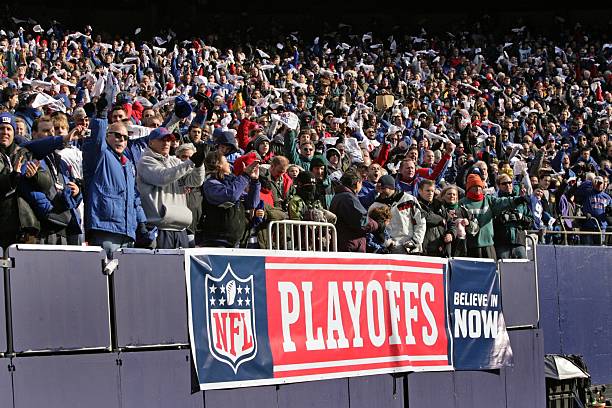Table of Contents
- When Do the 2024-25 NFL Playoffs Start?
- How Many Teams Make the NFL Playoffs?
- NFL Playoffs Format Explained - How Does the NFL Playoff Bracket Look?
- NFL Playoff Bye Week - Who Gets a Bye?
- What Are the NFL Playoff Overtime Rules?
- What are The NFL Tiebreakers for Division Winners?
- When Was the 2025 NFL Playoff Schedule Announced?
- 2024-25 NFL Playoff Schedule
- How to Bet on the Super Bowl
- NFL Futures Betting
After a grueling 17-game regular season, 14 NFL teams battle it out in a month-long postseason culminating in the biggest sporting event of the year – the Super Bowl.
Every game is win or go home, making every pass, run and kick life or death.
While the NFL Playoffs are similar to the regular season, there are several key differences to be aware of. It’s also important to know how the bracket, format and schedule work.
With that in mind, here’s everything you need to know about how the NFL Playoffs work before wagering on them at our favorite betting sites, many of which have special sign-up offers for new customers.
When Do the 2024-25 NFL Playoffs Start?
NFL Playoffs 2025 start on Jan. 11, 2025, with the Wild Card Round, which features 12 of the 14 NFL playoff teams (seeds 2-7 in each conference). The Wild Card Round starts one week after the regular season ends (Week 18).
The Wild Card Round, also known as Super Wild Card Weekend, includes six games in three days. There are two games on Saturday, Jan. 11, three games on Sunday, Jan. 12, and one game on Monday, Jan. 13.
The winners of these games advance to the Divisional Round, and the losers are eliminated.
How Many Teams Make the NFL Playoffs?
The NFL playoff bracket consists of 14 teams – seven from each conference.
All eight division winners automatically make the NFL postseason and are seeded 1-4 based on record. The two No. 1 seeds get a bye to the Divisional Round.
Each conference has three Wild Card teams as well (six total). These are the three non-division winners with the best record in each conference. They are seeded 5-7.
As there are 30 NFL teams, nearly half (46.7%) make the NFL postseason.
The current NFL playoff format has been in place since the 2020-21 season. Prior to that, 12 teams made the playoffs.
NFL Playoffs Format Explained - How Does the NFL Playoff Bracket Look?
The NFL Playoffs bracket starts with 14 teams – seven in the AFC and seven in the NFC. Division winners comprise seeds 1-4 in each conference, while seeds 5-7 are Wild Card teams (non-division winners with the best record).
Teams are seeded in order of regular-season record, then various tiebreakers if needed. The better seed always has home-field advantage except for the Super Bowl, which is usually played at a neutral site.
The two No. 1 seeds get a bye to the Divisional Round (second round), skipping Wild Card Weekend (first round) entirely.
The other 12 playoff teams square off in the Wild Card Round (six games – three per conference), with the six division winners hosting the six Wild Card teams. The six winners of those games advance to the Divisional Round – which has four games (two per conference) between eight teams – and the losers are eliminated.
The No. 1 seeds host the lowest seeds to advance, while the other two games feature the four teams in between. The four winners advance to the Conference Championship Round (third round), and the losers are eliminated.
The Conference Championship Round features two games (one per conference) between four teams. The winner of each game advances to the Super Bowl (fourth round), which is the championship game.
In total, there are 13 NFL playoff games with 14 teams involved in the current NFL playoff format.
A look at the playoff bracket with one more #SuperWildCard game left to be decided 👀 pic.twitter.com/TlbRTTMXWX
— NFL (@NFL) January 16, 2023
NFL Playoff Seeding
The NFL playoff seeding is determined by each team’s regular season record.
The eight division winners automatically get the top four seeds in each conference and are seeded in order of record. The team with the best record in each conference gets the No. 1 seed and a bye to the Divisional Round, while the division winner with the worst record gets the No. 4 seed.
The three non-division winners with the best record in each conference make the playoffs as Wild Card teams. They are seeded 5-7 based on regular season record, with the best record earning the No. 5 seed and the worst record earning the No. 7 seed.
Since teams are not seeded strictly based on record, it’s possible for a Wild Card team with a better record to be a lower seed than a division winner with a worse record. For example, a 9-8 team that wins the AFC South will have a higher seed than a 10-7 team that finishes second in the AFC North.
This happened in the 2023-24 NFL Playoffs when the 9-8 Tampa Bay Buccaneers, who won the NFC South, hosted the 11-6 Philadelphia Eagles, who finished second in the NFC East.
NFL Wild Card Round
The NFL Wild Card Round breaks down as follows in each conference:
- No. 2 seed (division winner with second-best record) hosts No. 7 seed (Wild Card team with worst record)
- No. 3 seed (division winner with third-best record) hosts No. 6 seed (Wild Card team with second-worst record)
- No. 4 seed (division winner with worst record) hosts No. 5 seed (Wild Card team with best record)
These six games are always hosted by the higher seeds (division winners), forcing the Wild Card teams to play on the road.
The winners of these games advance to the Divisional Round, while the losing teams are eliminated.
NFL Divisional Round
The NFL Divisional Round breaks down as follows in each conference:
- No. 1 seed hosts lowest remaining seed
- Second-highest remaining seed hosts second-lowest remaining seed
Not only do the No. 1 seeds have home-field advantage, but they also have a rest advantage after getting an extra week off to recover from the regular season and prepare for the playoffs.
The winners of these four games advance to the Conference Championship Round, while the losers are eliminated.
NFL Conference Championships
The NFL Conference Championship Round breaks down as follows:
- Highest-remaining seed hosts lowest-remaining seed in each conference
The winners advance to the Super Bowl and the losers are eliminated.
Super Bowl
The Super Bowl pits the AFC champion against the NFL champion in a winner-take-all game for the Lombardi Trophy.
The Super Bowl is always played at a neutral site decided years in advance. The “home team” switches year to year.
That said, it’s possible for a team to play the Super Bowl in its home stadium. For example, the 2020 Tampa Bay Buccaneers beat the Kansas City Chiefs in Super Bowl LV at Raymond James Stadium in Tampa, Florida.
Here are the future Super Bowl locations:
- 2025: Super Bowl LIX (Caesars Superdome; New Orleans, Louisiana)
- 2026: Super Bowl LX (Levi’s Stadium; Santa Clara, California)
- 2027: Super Bowl LXI (SoFI Stadium; Inglewood, California)
- 2028: Super Bowl LXII (Mercedes-Benz Stadium; Atlanta, Georgia)
NFL Playoff Bye Week - Who Gets a Bye?
Only two teams get bye weeks during the NFL Playoffs – the No. 1 seed in each conference.
The No. 1 seeds are the teams with the best records in the AFC and NFC, respectively. They get a bye week during the Wild Card Round, getting an extra week off between the end of the regular season and the start of the Divisional Round.
This incentivizes division winners who have already secured playoff spots to keep playing hard late in the season and try to secure the best record rather than resting their players.
The other 12 playoff teams do not get a bye. They jump straight into Wild Card Weekend the week after the regular season ends.
What Are the NFL Playoff Overtime Rules?
The NFL overtime rules are different in the NFL postseason compared to the regular season.
In the regular season, games that are tied go to a 10-minute overtime period. If the team that gets the ball first scores a touchdown, the game ends. If they don’t, the game continues.
Whichever team scores a touchdown first or takes the lead after both teams have possessed the ball wins. If the score is still tied at the end of overtime, the game ends as a tie.
In the playoffs, overtime periods are 15 minutes and both teams get the ball no matter what, even if the first team to get the ball scores a touchdown. Unlike the regular season, the game doesn’t end and the team that gave up the touchdown gets to possess the ball, making overtime fairer.
Playoff games can not end in ties. If the score is still tied at the end of the first overtime period, the game continues into a second overtime period.
That said, playoff games that go to overtime are still relatively rare. Only two Super Bowls have ever gone to overtime:
- Super Bowl LI (2017): New England Patriots 34, Atlanta Falcons 28
- Super Bowl LVIII (2024): Kansas City Chiefs 25, San Francisco 49ers 22
What are The NFL Tiebreakers for Division Winners?
The tiebreaker scenarios for division winners are the same tiebreakers used for the Wild Card teams.
- Head-to-head (best won-lost-tied percentage in games between the clubs)
- Best won-lost-tied percentage in games played within the division
- Best won-lost-tied percentage in common games
- Best won-lost-tied percentage in games played within the conference
- Strength of victory in all games
- Strength of schedule in all games
- Best combined ranking among conference teams in points scored and points allowed in all games
- Best combined ranking among all teams in points scored and points allowed in all games
- Best net points in common games
- Best net points in all games
- Best net touchdowns in all games
- Coin toss
When Was the 2025 NFL Playoff Schedule Announced?
The NFL 2025 playoff schedule was announced during the offseason over the summer. However, specific matchups and scheduling won’t be announced until the regular season ends in early January and NFL playoff teams are determined.
- NFL Wild Card Round Schedule: Jan. 11-13, 2025
- NFL Divisional Round Schedule: Jan. 18-19, 2025
- NFL Conference Championship Schedule: Jan. 26, 2025
- Super Bowl Schedule: Feb. 9, 2025
2024-25 NFL Playoff Schedule
The NFL Playoffs 2025 schedule is as follows:
NFL Wild Card Round Schedule
Saturday, Jan. 11, 2025
- TBA vs. TBA, 1 p.m. ET, CBS or FOX
- TBA vs. TBA, 4:30 p.m. ET, NBC/Peacock
- TBA vs. TBA, 8 p.m. ET, Peacock
Sunday, Jan. 12, 2025
- TBA vs. TBA, 4:30 p.m. ET, CBS or FOX
- TBA vs. TBA, 8:15 p.m. ET, NBC
Monday, Jan. 13, 2025
- TBA vs. TBA, 8:15 p.m. ET, ESPN/ABC
NFL Divisional Round Schedule
Saturday, Jan. 18, 2025
- TBA vs. TBA, 4:30 p.m. ET
- TBA vs. TBA, 8:15 p.m. ET
Sunday, Jan. 19, 2025
- TBA vs. TBA, 3 p.m. ET
- TBA vs. TBA, 6:30 p.m. ET
NFL Conference Championship Schedule
Sunday, Jan. 26, 2025
- NFC Championship Game: TBA vs. TBA, 3 p.m. ET, FOX
- AFC Championship Game: TBA vs. TBA, 6:30 p.m. ET, CBS
Super Bowl Schedule
Sunday, Feb. 9, 2025
- Super Bowl LIX: TBA vs. TBA, 6:30 p.m. ET, FOX
How to Bet on the Super Bowl
The Super Bowl is the biggest sporting event in North America and offers a variety of betting markets at our favorite Super Bowl betting sites. Once the matchup is set, you can bet on game-specific wagers (moneyline, spread, Over/Under, etc.) along with more novelty prop bets like the coin toss or Gatorade color.
While NFL playoff odds and lines aren’t available for Super Bowl 2025 yet, you can bet on Super Bowl odds for futures markets in the meantime, including which team will win Super Bowl 2025 or what the specific matchup will be.
NFL Futures Betting
Find season-long NFL futures on Forbes Betting. You’ll find the best NFL betting promos and NFL betting site recommendations throughout the season.
New to NFL betting? Learn how to bet on the NFL today.


